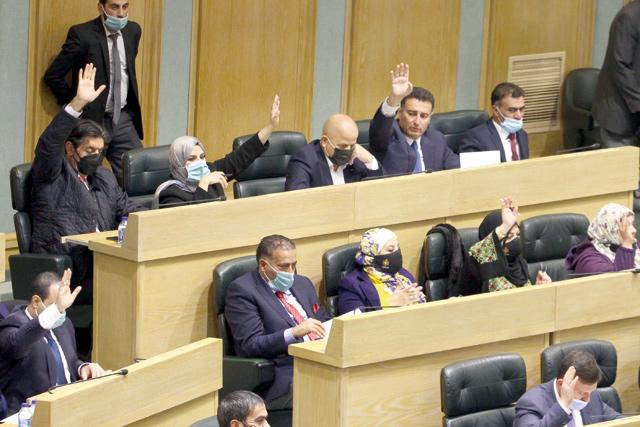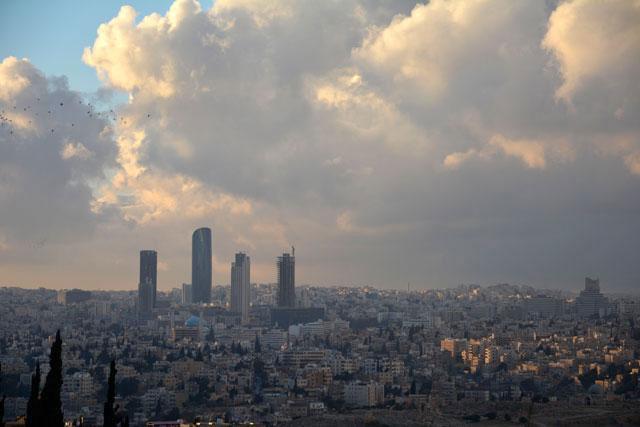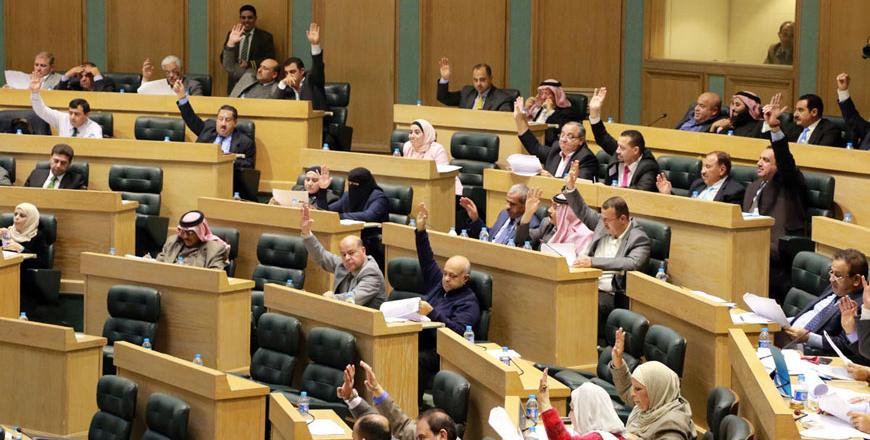You are here
Lower House passes 2021 state budget draft law
By JT - Feb 21,2021 - Last updated at Feb 21,2021

Lawmakers are seen during a Lower House session on Sunday (Petra photo)
AMMAN — The Lower House on Sunday evening passed the 2021 state budget draft law and the 2021 draft for the budgets of independent public institutions.
The majority of deputies endorsed cutting the current expenditures by JD148 million, and approved the Parliamentary Finance Committee’s recommendations, the Jordan News Agency, Petra, reported.
The approved recommendations include commitment to issue quarterly reports on the actual data about revenues, expenditures and economic indicators, to be submitted to the House of Representatives.
Other recommendations focused on the need of forming a national team to evaluate the Kingdom’s energy issue and develop solutions to alleviate energy burdens, in addition to supporting the agriculture, health, education and labour sectors, and developing the Kingdom’s governorates, as well as merging and abolishing independent governmental institutions.
The recommendations also highlighted the importance of activating public-private sectors partnership, establishing a comprehensive health insurance, introducing a wage cap, in addition to a recommendation on wage growth for military personnel and civilian employees, workers and retirees.
The panel also called for distributing the surplus electricity on industrial sectors, along with transferring some JD10 million of the Ministry of Education's capital expenditures to expenses for recruitment purposes.
Once the legislative process of the budget is completed, following its publication in the Official Gazette, the government will move forward with spending and revenue collection, with the government forecast to collect JD7.87 billion from sales tax, at a rate of approximately 49 per cent, while collection of direct taxes revenues is estimated at 20 per cent and that of foreign grants is estimated at 7 per cent, the Jordan News Agency, Petra, reported.
Revenues from sources other than taxation, according to the government estimations, would constitute 24 per cent, including the sale of goods and services estimated at JD960 million, ownership income at JD392 million, while fines, penalties and confiscations are expected to generate JD60 million, retirement returns JD8 million, in addition to various revenues of JD487 million.
Public spending is also estimated to reach JD9.93 billion, 24.5 per cent of which to be spent on the civil apparatus, 27.5 per cent on the military and security bodies, 10 per cent on capital spending, less than 2 per cent on new projects, 15 per cent to serve public debt, and 16 per cent to go to retirement and compensation.
The remaining spending, some 5 per cent, includes cash assistance of JD201 million, medical treatment of JD75 million, university support of JD70 million, payment of previous commitments of JD74 million, and support for government units of JD21 million, in addition to JD55 million in wheat and fodder subsidies.
The budget deficit is estimated at JD2.05 billion. Excluding foreign grants, the deficit is estimated to reach JD2.6 billion.
The revenues of the 25 government units are expected to reach JD916 million, while expenditures are expected to hit nearly JD1.5 billion, with a deficit of JD586 million, before funding. Excluding the JD283 million deficit of the Water Authority of Jordan (WAJ) and the JD335 million deficit of the National Electric Power Company (NEPCO), the government units’ deficit will become JD31 million in savings.
Earlier on Sunday during the session, prior to listening to MPs’ remarks on the budgets, Prime Minister and Minister of Defence Bisher Al Khasawneh said that he asked the environment minister to collect samples from the Waleh Dam to check on suspicions of waste water leakage from a nearby river into the dam before acquainting the Lower Chamber with the results.
The premier said that Water Minister Motasem Saidan denied that the source of the leak was the Southern Amman station, the Jordan News Agency, Petra, reported.
Khasawneh also expressed condolences to Khaled Mashagbeh, a citizen whose house witnessed a fire that resulted in the death of his four children and the injury of his wife, noting that His Majesty King Abdullah has always felt with the people and offered assistance to alleviate their suffering.
Embarking on the budget deliberations, MP Nassar Heisah criticised the budget and described it as an “annual drama” whose figures depended by 75 per cent on tax revenues.
MP Islam Tbaishat said that the budget did not mention any raise of pensions despite increasing inflation, poverty and unemployment rates, which as a result exacerbates the suffering of pensioners.
Deputy Rahaq Zawahreh said that the budget was based on controlling the expenses at various levels in light of budget deficit and uncertainty in reaching solutions, stressing that this year will have a financial deficit as the COVID-19 pandemic continues.
MP Eid Nuaimat criticised the inability of the budget’s revenues to cover expenses in 2021, which, according to him, will lead to worsening the economic crisis.
MP Mijhem Sqour referred to His Majesty’s letter to the General Intelligence Department, in which King Abdullah observed the future stage of the Kingdom through preparing clear mechanisms to move forward.
Deputy Habes Shabib said that the Kingdom’s budgets before, during, and after the pandemic “never change and continue to rely heavily on citizens’ pockets” through taxes and fees and away from concrete studies, all the while some officials in the government receive very high salaries, at a time when employees in the public sector and security forces receive very low salaries.
Related Articles
AMMAN — The government's general revenues rose to about JD7.325 billion in 2021, the Ministry of Finance announced on Wednesday. The ac
AMMAN — Domestic revenues estimated in the draft 2019 state budget law are "a lot exaggerated" as they exceed the expected 4.8 per cent grow
AMMAN — The Lower House on Thursday passed the draft 2016 state budget law in addition to the budget bill of independent government institut













